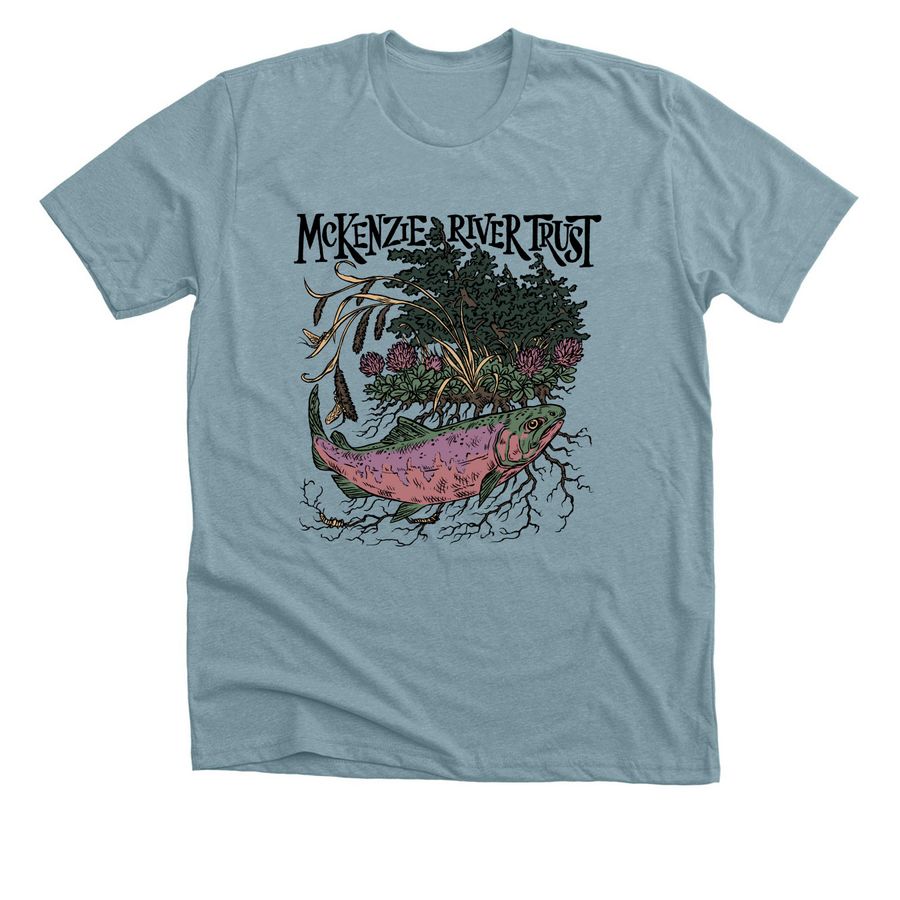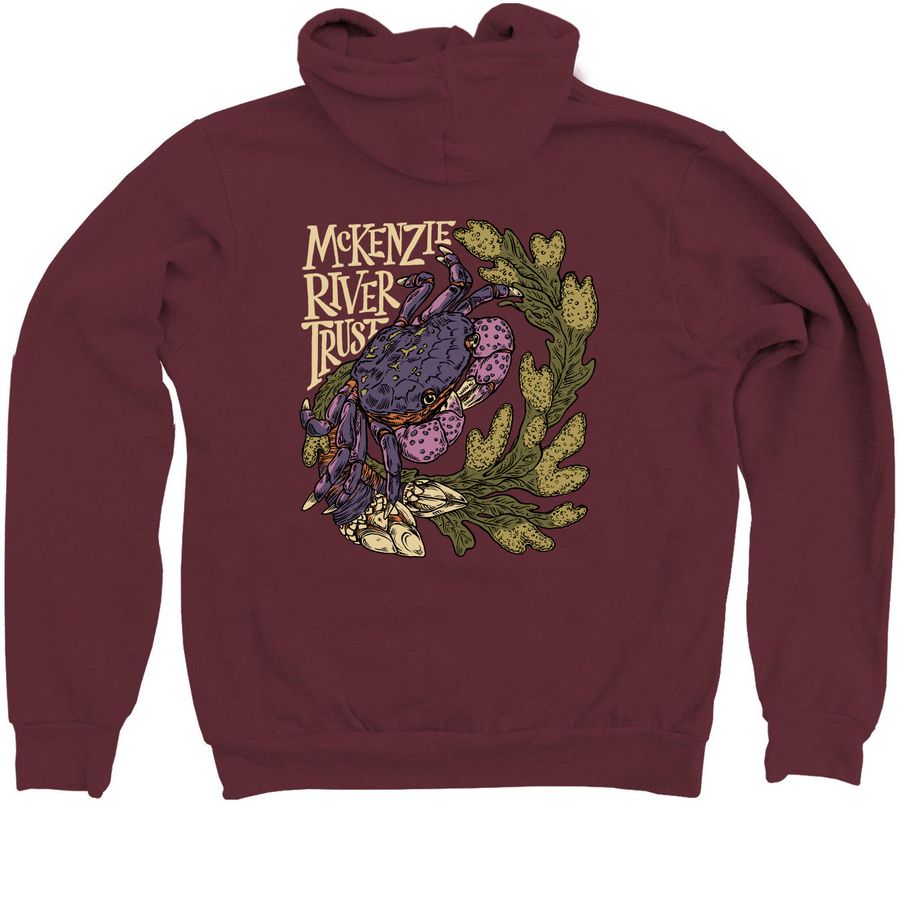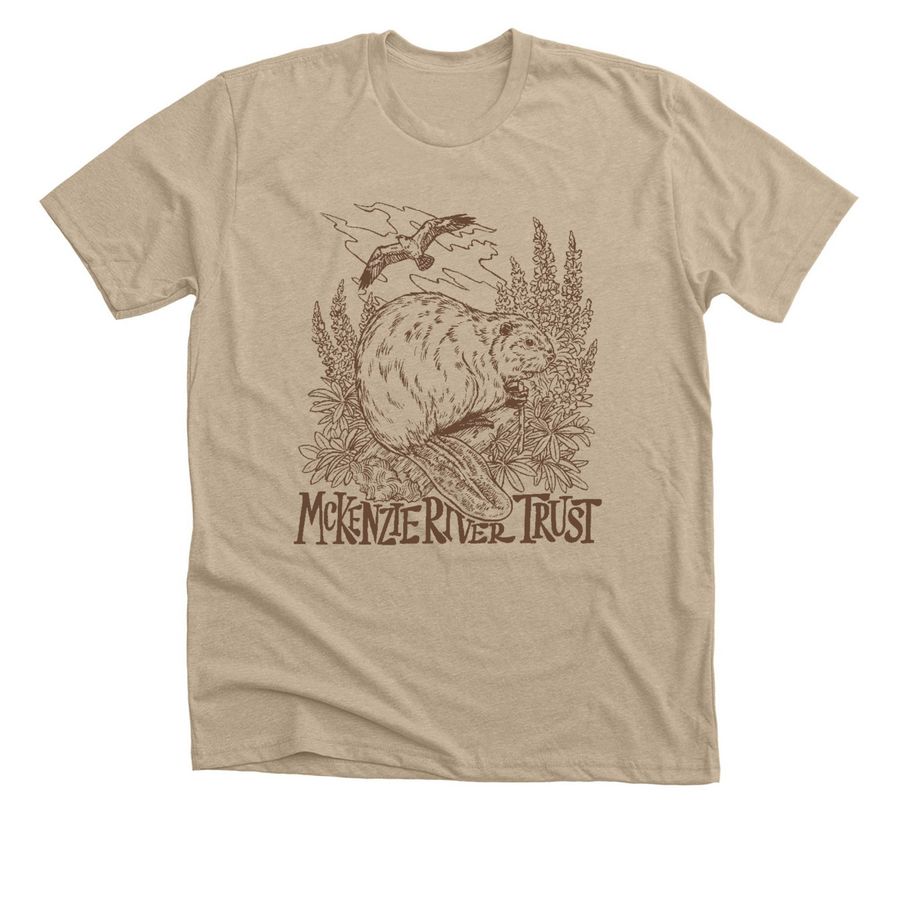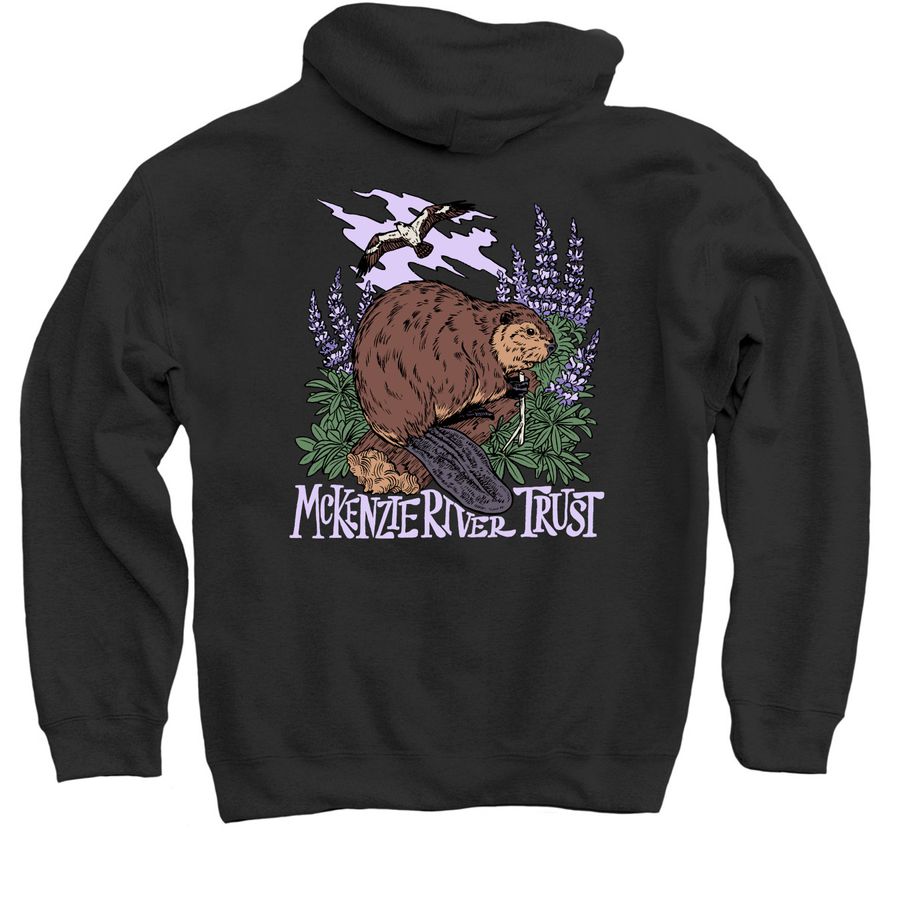Kelly Terwilliger and Eve Müller
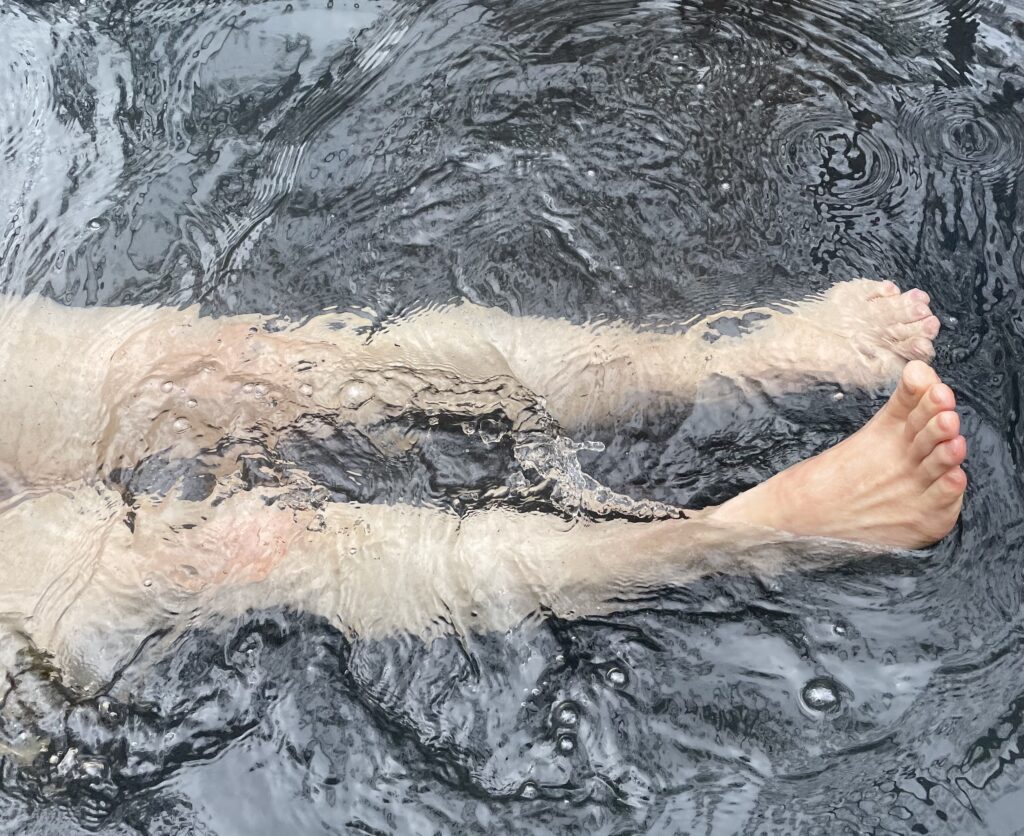
These are excerpts from a collaborative, book-length work based on a series of 12 swims – one a month – in a different body of wild Oregon water. We fully immersed ourselves in the water both by skinny dipping, and researching the natural and human histories of each place. As part of every chapter, we wrote each other “water letters” – three sets of which are included here.
Chapter 4 – Ruin: Wall Creek Warm Springs, April
Letter from Eve to Kelly
The dirt road winds up and up.
Your small car passes through the colorless landscape and I think
of silent films unspooling themselves
black and white scene after
black and white scene
colors of breath and dusk.
Just last year, the Cedar Creek fires blackened the trees along the canyon
charred branches, left a trail of debris in their wake.
Perhaps we should turn back, I say.
I fear disappointment,
shy away before it leaps into my lap.
But you are determined to forge on.
And you are right to keep going.
We arrive at the trailhead, our path pocked with dark puddles.
vista apocalyptic.
Nothing looks as I remembered it.
But I was here a lifetime ago.
Perhaps a dozen lifetimes.
Are you, too, overcome with nostalgia?
Even though you’ve never been,
can only imagine the verdant kingdom
this dead place once was?
The air is forbidding in its stillness.
Where are the plants and animals?
No dark eyed juncos singing arias.
No cricket timpani.
No chuckling of leaves in wind.
We point our cameras in all directions.
Do you, too, feel breathless?
There is so much story here.
Action, destruction, the promise of regeneration.
I need a new word to describe this feeling:
To love a dead forest.
It is raining now
soft as cobweb
light as a kiss on the neck.
I watch you beneath your bright umbrella
lovely as you pick your way bare-skinned down the slope,
venturing a few toes into water
the meditation pool a palest blue.
Then more disappointment.
The pool is small and the water dirtier, cooler than either of us expected.
You are too polite to complain.
I am too vain to admit I’d hoped for a different sort of epiphany.
Yet we stay in the pool, stocking caps on heads, until our fingers prune.
Ghosts of needled fir all round us.
Cinder and ash
rib and spine
stark cathedral reminding us of origins and endings.
I was here once
in a green life
with a husband and children
pools lush with moss and fern
dappled light on young haunches.
Daughters are fledged now
forest and marriage burned to bone
yet here we are – you and I – naked and alive in this blackened pool
warmish water licking our wrinkled skins
echoes of dragonfly wings and flight.
Letter from Kelly to Eve
Silence, yes, unspooling into the burn.
I remember a child I taught in the school we passed on our way out here.
A room of old desks and windows looking into cloudy trees.
We wrote stories and poems, years ago, but he didn’t show up
on the day the children read their work aloud
even though there were cupcakes.
He’d caught on fire, the teacher said, grieving the burnt
boy flown a hundred miles away
and whatever his life would be when he returned.
Now the blackened forest. I don’t blame you, wanting to turn back.
Dark forms where trees once stood alive. Black lines
in puddles where husks of trunks
descend into their reflections, charcoal pillars
dividing sky into slivered pieces.
Ghosts with the strange hair of blackened twigs.
The burnt hair of trees.
Unearthly beauty, here on earth.
No birds. No visible life. Just these hollow
caverns of trunks half eaten away, and the giant blackened logs
sawed through to clear the road, the sweet
yellow wood inside, not alive, but fragrant, the scent
of our childhood lumber town.
I’ve never been here before.
What must it be like to come to this spring
if you once knew and loved it? A devasted landscape.
I try to imagine it green,
imagine the day you came with children
scampering over a mossy log that’s absent now.
I imagine them splashing, poking around, calling to each other, or you, or their dad.
Now only shadow shapes are here. The living things are gone.
Except us. And water.
You in your yellow hat and big black boots.
The wet ground. We tramp around
the dark mascara-ed lines in all the eyes of tiny pools.
And the creek, loud, alive,
coursing through these empty halls,
talking and talking into the void. Chuckling and singing,
like a baby who feels the wind tickle his naked chubby feet
even when his brother is in bandages.
It doesn’t matter that no tree or leaf or bird or animal replies.
The rocks and the river are what they are, going on.
The creek keeps up its song.
I’m glad it’s here. I’m glad you’re here, grinning up from the bluish pool.
Speck of life. We crouch in lukewarm water with our hats pulled over our ears.
My body shivers, naked in a pool in the middle of a blasted forest.
Surely there is an incantation. Some blessing to be whispered.
Instead we share a muffin, trying not to lose our crumbs.
We look at our milky underwater legs,
and all the stuff our being here stirs up: wet ash, algae, silty muck.
This pool that used to be a clear one.
Water. Water. Bubbling up. Burbling by.
Through the land of the dead.
When we drive back into the rest of the world,
garbage bags line the empty woods, full of what? Charred debris, perhaps.
A sofa rests on the road’s shoulder. Or is it a bed? I can’t remember. Can you?
A distressing softness left out in the settling rain.
But we can’t find the shrine we’d seen before by the side of the road.
As if it were meant to be only the forward to the story
and not the epilogue, that little marker, festooned with plastic flowers,
up on the edge of forest not yet burned—
When we reached the red light, we both wanted to take a picture.
You hopped out, I stayed behind the wheel.
It was the way the dark trees, alive, disappeared into ordinary cloud.
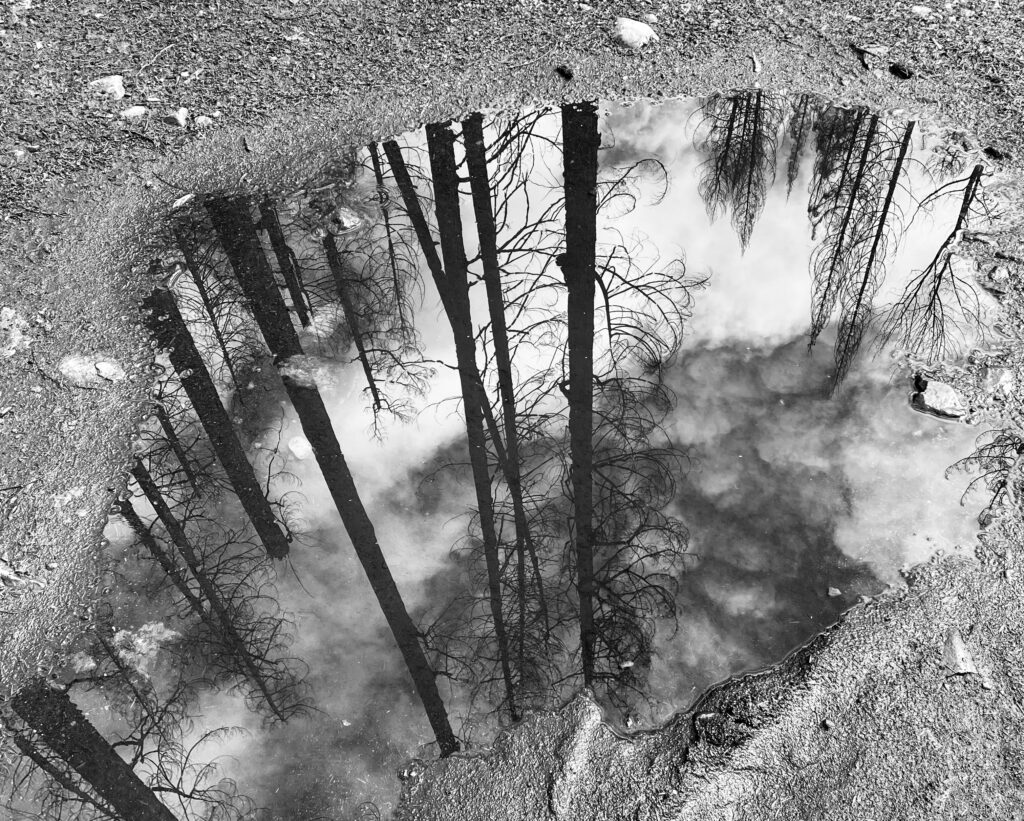
Chapter 7 – In Quest of the Disappearing Lake: Lost Lake, July
Letter from Kelly to Eve
Here’s what I remember:
It was our longest drive yet. We talked and talked as the trucks and cars and trailers sped by and the river glinted between the teeth of empty burnt-out trees.
We drove and drove. Too far, I finally said, turning into a deserted pull-off. I spread the atlas on the hood of the car, and we saw the tiny, numbered road we’d missed. A gust of wind snatched two pages from the loosening binding and they went lolloping away as if the land wanted to reclaim itself from how we’d rendered it.
The road was a roller-coaster of potholes and we stopped at the first picnic table we saw. You were ready to skinny-dip as soon as we got out of the car; I wanted to find the lake’s departure place first—the hole into which it drains away each year.
A dirt path led down to the lake now dressed as a meadow. Burnt slopes rose on the far side of the highway, but the meadow greens!—weren’t they glorious? Reeds thick, dark, and glossy, with lighter greens, more delicate among the grasses and shrubs, and other places bright with hints of yellow-green and olive over patches of still-damp ground.
I was so hopeful we were close. The ground blinked with tiny toads like bits of earth come to life. Surely water was near! Blue damselflies, golden damselflies, shimmers, lifting away, settling farther off as we drifted through the lake that was and wasn’t there.
Where was the mysterious doorway into underground? We couldn’t find it.
Maybe this was as “lake’ as we were going to get. So we skinny-dipped. Naked among the dry reeds we crouched, dove and surfaced again, leaving flattened nests behind us. Like the beds of animals. I thought of a place I once found in a meadow, tamped down by a herd of resting elk. I could still smell them on the grasses. I lay down where they had been and felt like a wild thing. Peaceful, until I thought: What if a bear came by and found me smelling like a tiny elk?
Here, the sun blazed down. We took pictures of arms and legs waving from the sea of grasses, but swimming in the hot brightness of dry reeds was not the pleasure for me that water is, and I was happy to pull my clothes back on.
When a couple of cars went by, I was glad we’d finished our reedy frolic. But perhaps they indicated something farther down the lumpy road.
We drove on. Sure enough, a glint of wet, shallow and silty. A congregation of geese stood preening, and two men appeared to be fishing. In almost no water. They made me uneasy.
Skirting them, we went to where a stream rivered off across the meadow. Then we saw it: one watery hole with a skin of seed and goose fluff.
And another, just under the surface of the flowing current where it swirled like a magic spell. Circular rafts of tangled, matted grasses spinning clockwise, clockwise…
Oh, to immerse in this! But we only put our feet in, not wanting to break anything or disturb the cyclings of mats on which rode multitudes of more tiny toads. Like rotating dance floors, you said. I liked thinking of toads dancing over the hole where water went percolating down, travelling for years, until today’s surface of Lost Lake reached somewhere into the future of Clear Lake, miles away.
The geese shouted. One of the strange men in his ritual of non-fishing peered in our direction and disappeared again.
We walked back through the damp and drying lakebed full of sprouting mullein and thick stands of thistle about to burst into honeysweet and purple softness. You took pictures of mats of yellow flowers. I took a picture of a feather caught in grass.
We stopped at Clear Lake on the way back. Clear Lake, with its underwater petrified forests and lava flows. Its boaters and picnickers. We picked our way down the shady hillside and went right in. First clothed, and then—we had to take the wet stuff off anyway—we went back in, bare. Our feet and waving limbs stirred up globs of algae, but we swam past them to where the water was very deep, and green, and lit with long shafts of light.
And then we drove home, talking, talking, talking again. Wasn’t it a perfect day?
Letter from Eve to Kelly
Here in the lap of the Cascades, between Mt. Jefferson and Mt. Washington, signs of fire to the north and south of us. At their most fierce, the Booth and Bear Butte fires of 2003 burned more than 10,000 acres per day. The wildness of these fires is almost unimaginable to me. They filled the air with ash, destroyed the habitats of fox, birds, fish, and poisoned watersheds. Still, I was struck by how the landscape possessed an unexpected loveliness. I’m not sure what it was that moved me. Was it the remnants of past life, the fragile beginnings of new life, the breathtaking power of nature to extinguish and rebuild?
we pass what were once delicately
feathered trees
all that is left now
a child’s crude sketch of forest
We drove right past the unmarked turnoff, talking about geology. About how water from Lost Lake drains into several holes near the shore, filters down through layers of volcanic rock, makes its way slowly into a buried tributary of the McKenzie River where it burbles up again at the edge of Clear Lake twenty miles west. You told me how scientists tested radioisotopes in the two lakes, and determined it takes as much as seven years for the water to travel the distance. I love the idea of the water’s leisurely underground voyage. Taking its own sweet time.
At the crest of the pass, we realized we’d driven too far. We read about fires at a lonely kiosk overlooking thousands of acres of burned-out landscape, and turned back the way we came. This time we found the lake. A rusty post marked 388 behind a gangly stand of mullein.
A pitted dirt road. Lost Lake waterless, apocryphal, nothing but a memory of itself.
empty lake
a soft green belly
we waded into the meadow
grasses parting before us
like curtains
flushing blue and gold insects
birds the color of pitch
numberless toads
no bigger than dimes
hopping high as our knees
I was so eager to be naked, I started taking my clothes off before we reached our destination. You laughed. But without water, who is to say where and when we arrived? How do we wade into a lake without water? Where was the shore? Where were the shallows? Where did the bottom of the lake fall away and leave us suddenly, blessedly adrift?
Without clothes, we were small happy animals. Cavorting on the lake floor. Hiding. Revealing. Here an arm. There a leg. I wondered if the cars driving by on the highway could see us – two middle-aged women, skinny dipping in an empty lake – or if all they could see were flashes of color and light.
We took pictures. Lots of them.
you noticed
how the grasses
unlike water
retained the imprint of our bodies
your camera
a green eye
seeking out the grassy nest
where skin was
We ate lunch at a lopsided picnic bench. Cheese and crackers and a salad of grains and fruit. A few cars with tinted windows, radios pulsing, arrived and departed. I realized I felt safer with you here, too. Men in their cars would have frightened me had I been alone.
We went searching for the drain hole, the place where the lake disappears. The opposite of a spring!
We spotted a small patch of blue, two men standing near the edge. Perhaps they would know where the lake drains. Should we ask them? I called out to the men. The younger one, casting his fishing line over and over, didn’t even turn around. What was he doing there by the side of the lake? The water was less than three inches deep. There couldn’t possibly be fish. Birds, yes. Bugs, an endless parade of mud-colored toads, but no fish. The older man consulted with the younger one, spoke to us in heavily accented English, pointed north along the edge of the creek.
We headed off in the direction he indicated, and suddenly, there it was before us. A dark hole, maybe ten feet across. Lazy brown water. Bits of straw floating on the surface. Another hole, unexpected, at the edge of the creek bed. This one bluer, with disks of dried grass whirling like cogs, each one covered with tiny toads.
A part of me wanted to strip down again, jump in. Did you feel it, too? But Lost Lake, almost entirely dried up now, surrounded on all sides by burnout, felt fragile. I didn’t want to cause more harm to an already damaged landscape. There was also the nearness of the strange men. I didn’t want to be caught with my pants off. And besides I felt sated. Grateful to have experienced the glory of floating with you in a waterless lake.
Clear Lake was the coda to this story. The place where the water from Lost Lake, years later, emerged clean and pure. We hopped out of the car and found a spot along the shore. There was a couple in camp chairs holding hands on the other side of a fallen tree, people in the distance paddling kayaks. At first we decided not to skinny dip. We’d already exposed ourselves fully to Lost Lake. No burning need to do it again. But as we swam out in our underwear, we thought, why not? What have we to lose? And we stripped down once more and immersed ourselves in the cool blue shade.
Chapter 8 – Occupying Space: Brice Creek, August
Letter from Eve to Kelly
As we drove south and east toward Brice Creek, we talked about the Kalapuya who called this place home long before white people like us arrived. We parked by the edge of the creek, unsure of where the trailhead lay. After a bit of walking without finding a public pathway to water, we cut through a campsite where no one appeared to be home. The place was a mess, but strangely beautiful. Old mattresses spread out under tarps. Bikes chained to posts. Everywhere hoses, rope, shovels, plastic buckets. Someone had artfully arranged a heap of large pinecones on a bed of needles. It felt lived in, like someone’s nest. Even though there was no sign of occupants, I felt I was violating another’s privacy – traipsing through a stranger’s home. I wanted to avert my eyes but also drink in the intimate traces of someone else’s life. A feeling I often get in the streets of Eugene when I pass a heap of blankets, plastic bags. Where to cast my eyes? Towards or away?
As we descended the slope we saw a man standing by the edge of the creek.
His beard wild
legs covered in tattoos
salmon and fir trees
if memory serves.
The creek was inscribed there, too,
or did I imagine
water coursing down his calves?
We apologized for walking through his campsite. He laughed and welcomed us. I don’t own the creek.
We talked with him for a good long time. All three of us glad to be standing near the creek, sharing words about the depth of water, strength of the current, the little brown snails crawling over everything. He showed us how he panned for gold, the system he created for piping water through several filters, his finding of gold flakes but no nuggets. Not yet.
You and I stood in the creek, water pressing hard against our ankles. We began picking our way down the center of the creek towards what we hoped was a swimming hole. The rocks were slippery, the water urgent. I stumbled, graceless. You, too, found navigation difficult. The tattooed man, observing us, searched among his belongings, found wooden staffs for each of us. He seemed glad to offer us something useful.
I felt like John the Baptist as we headed upstream.
Just around the first bend in the creek, we saw a clear deep pool spread out before us, a little waterfall tumbling into it, the tall straight rock alongside the creek, our hands running over its smooth, warm flank.
After so many swims, we knew the routine. We stripped down without speaking, entered cool water, swam towards the waterfall, pulled our naked bodies up and over the lip of it.
We sat on the ledge
water green and
firm as muscle
rushing past.
I felt at home in the water, happy to be sitting here brazenly naked with you. I didn’t care if the man with the salmon tattoo might see us, seated there like aging mermaids. Our interaction with him felt free of the taint of sex. He was past all that, and so were we.
After we pulled on clothes, we walked back down the creek. It was easier walking downstream. We laughed when we realized we hadn’t trekked more than a hundred yards to our swimming hole. Hardly private!
Freshwater snails
everywhere I step
I try not to crush you
beneath my feet.
You suggested we hike up the road to some larger, grander swimming holes. We took another path toward the creek. This time we ran into a barking pit bull bitch protecting her young. She charged us, hackles raised, teats dangling like rubber gloves. Her owner called her off – Mona, cut that shit out! – but we decided to turn around, look for more peaceable points of entry.
Signs along the road said that gold panning was illegal here, destructive of delicate landscape. What to make of this? The man with the salmon tattoo probably had no other means of supporting himself. And yet we rely on the Brice Creek area – spared the over-logging and road building that have plagued nearby parts of the forest – to soak up carbon from the atmosphere like a fat green sponge.
We crossed a bridge and came upon several Hispanic families picnicking beneath big black rocks. Young men were cannon balling from above. Women watched from below. You and I joined the women. I waded in wearing only my underwear. You joined me in your summer dress. You looked like a water flower, hem of your dress floating on the surface. We swam up a narrow canyon where you showered beneath the falls, water streaming down your cheeks.
Letter from Kelly to Eve
Once more we approached a place in which we don’t ordinarily dwell.
I was afraid we’d missed a turn, but really we hadn’t gone far enough.
And then we came to the bridge I’d been waiting for, and I remembered walking up the creek when my children were children: sunlight and water shadows, ripples and waterfalls, drifting leaves, caddis fly larvae, little fishes, and boy legs splashing along.
Here I was again. With you. A beautiful creek on an August day.
There was a path to the water—but it passed through someone’s camp, someone else’s temporary “territory.” There we were, surrounded by piles of another person’s life, an overflowing, a sudden density of things laid out like a workspace, a workshop, a home.
I felt like a trespasser, but so too, perhaps, was the man who occupied this space— with, we soon realized—his unofficial one-man gold-panning operation.
We didn’t see him right away, but he was there, large, quiet, like a piece of the landscape. We must have registered immediately as “harmless:” two middle-aged women bumbling through. He was not defensive. Nor did he seem wanting for company. He did not need us to get out of his way; he did not need, us to linger. We were like leaves that had drifted into his camp. Birds briefly alighting. Sure, he said, we could walk on through.
I remember one walking stick was ready, leaning against a tree—he’d surely used it himself. The second he broke from a longer fallen branch. Take them, he said. We promised to bring them back, but he said he could always find more. He seemed pleased to be helpful.
We thanked him for his kindness and picked our way up the creek. I had a pool I wanted to show you, but even with walking sticks the creek got deep faster than I expected. So why not swim in the beautiful right where we were?
We lolled, luxuriated, at ease and glad in the water.
Remember how I wriggled into that cleft, that cradle
of curved and sculpted rock?
The water stretched
over the lip like spun glass.
We sat in the shining spill and I forgot I was naked.
Just an animal, with my animal friend, sitting in a stream.
Bubbles and ripples. The currents swirling new shapes
to slip around the shapes of us.
When we went back to the man’s campsite to return his sticks, he insisted we keep them as long as we needed. Go on, take them, he said, so we did, because we didn’t want to refuse his gift. No, he hadn’t found any nuggets yet, he said, just flakes. I said I hoped he’d find a nice big chunk of gold, and he smiled and gave each of us a piece of jagged quartz from his collection—remember how he picked up two pieces and then reconsidered, put one back, and picked up another instead—so that we’d each get the same size? It made me think of my sons when they were small, and how important fairness was, small signs of it, like the relative sizes of special rocks.
Such a day of encounter and overlap and trespass and shared space. After the gentle man, we stumbled upon a yelling woman, a snarling dog and her dangling teats, and three gleeful pups dancing around barking. We had committed another “trespass;” this place was occupied, and we would not this time be welcomed through.
But eventually we found the second bridge—not far from the pool I wanted you to see. Three teenaged boys passed us with towels. They reminded me of my once-teenaged sons–and I felt a surprising surge of affection for people I didn’t know. I once read a line: approach each being as your beloved child. How often do I do this? Everything as kin? I didn’t with the scary dog. Or the yelling woman…What if I had?
We reached the pool. The falls, the cleft. Oh wow, you said, and I beamed inside, happy you liked it, too.
The deep place
where the water spills
through a hallway of rock and then
pools, deep and green. We
swam out and floated
like leaves
while a man and his son
and three friends
dropped again and again
from the high lip of stone, sending up
beautiful shatters of spray.

